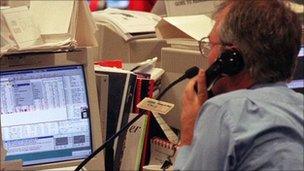Twitter predicts future of stocks
- Published

Twitter may not yet have found a way to make money for itself but it is doing a good job of generating cash for its users, research suggests.
A study conducted by a PhD student at the Technical University of Munich found that investors following stock market tweets could have achieved an average return rate of 15%.
Timm Sprenger analysed 250,000 tweets sent over a six-month period.
He predicts Twitter will increasingly offer specialised information to users.
Holy grail
Thousands of stock-related messages are sent every day via tweets. Tweeting investors mark tweets according to company stock symbols.
There was "a striking co-ordination" between what Twitter was saying about shares and other information from investors and analysts, he found.
"I don't think it is the Holy Grail to make millions but it is a very credible and legitimate source," he said.
He also found that more valuable information was retweeted, meaning that it reached a wider audience.
The study formed the basis of the website TweetTrader.net where the real-time sentiment for individual stocks can be accessed. The site is currently in beta (trial).
Mr Sprenger conducted similar research on the federal elections in Germany last year. Using Twitter, he was able to predict the final results for each political party to within 2% of the votes they received.
"We got as close as the research institutions that spent hundreds of thousands of pounds," he said.
Twitter already extrapolates the information that is most-talked about via its Trending Topics feed.
Mr Sprenger predicts that it will increasingly offer more specialised versions of the service.
Twitter mood
Derwent Capital Markets, a London-based family-owned hedge fund already offers investors the chance to use Twitter to gauge the mood of the stock market.
It follows tweets and charts the number of times certain words rise above or fall below average.
The fund uses a tracker developed by academics from the universities of Indiana and Manchester.
In October the researchers published a paper - Twitter mood predicts the stock market - in which they claimed that a change in emotion expressed via Twitter would be followed by an equivalent change in the Dow Jones index.
They said they could predict its movements with 87% accuracy.
- Published1 April 2011
- Published21 March 2011
- Published23 March 2011
- Published15 February 2011